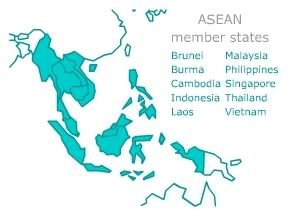ASEAN Summit: 16 Asian nations agree on boosting energy security, biofuels
 The Association of South East Asian Nations (ASEAN), convening in Cebu, the Philippines, for its annual summit, is to create a tighter political bloc, turn the region into a free-trade zone by 2015 and fight harder against terrorism, poverty and threats to energy security.
The Association of South East Asian Nations (ASEAN), convening in Cebu, the Philippines, for its annual summit, is to create a tighter political bloc, turn the region into a free-trade zone by 2015 and fight harder against terrorism, poverty and threats to energy security.China, Japan and South Korea, who are participating in the expanded East Asia Summit involving ASEAN and its six "dialogue partners", hope to join the Southeast Asian grouping's economic circle. The other dialogue partners are Australia, New Zealand and India.
Together, these 16 nations are expected to agree to boost Asia's energy efficiency and combat climate change by seeking new fuel sources, particularly biofuels, according to a draft document approved by foreign ministers. The "Cebu Goals on East Asian Energy Security" are to be signed on Monday by the heads of government.
The plan aims to help countries reduce their dependence on conventional fuels through intensified energy efficiency programmes, expansion of renewable energy systems and biofuel production and utilization.
The accord does not say what types of biofuels might be emphasised and does not give specific details of the kinds of energy efficiency programmes being considered. But some ASEAN countries such as Malaysia have started working to commercially produce alternative fuels such as biodiesel, comprising mainly palm oil, and ethanol made from the sap of nipah trees. The 10-member Association will also work towards freer trade on biofuels and a standard on biofuels used in engines and cars.
Minimising greenhouse gas emissions and investing in infrastructure - such as a regional electricity grid and a natural gas pipeline spanning Southeast Asia - to ensure stable energy supplies are among the draft agreement's other goals:
 ethanol :: biodiesel :: biomass :: bioenergy :: biofuels :: energy :: sustainability :: climate change :: fuel stockpiling :: energy security :: regional integration :: ASEAN ::
ethanol :: biodiesel :: biomass :: bioenergy :: biofuels :: energy :: sustainability :: climate change :: fuel stockpiling :: energy security :: regional integration :: ASEAN :: The blueprint provides no timeframe for these goals, which underscore increasing efforts by ASEAN in recent years to enhance energy cooperation and alleviate the impact of high oil prices.
Hosting the Summit, Philippines President Gloria Macapagal Arroyo - in a statement expected to be issued at the end of ASEAN's annual summit over the weekend ahead of the wider East Asian conclave - says ASEAN wants to work with neighboring countries to explore alternative energy resources and sustain financial growth.
Government leaders have "noted with concern the prolonged rise in oil prices and the difficulties (posed) to the economic growth and development of ASEAN member countries and the region," said a draft of Arroyo's statement.
Fuel stockpiling
The energy security agreement also encourages countries to explore possible modes of fuel stockpiling through regional arrangements, and urges oil-rich nations to channel petroleum profits toward equity investments and low-interest loan facilities for other developing countries.
The draft, which was approved by foreign ministers, also calls for a reduction in greenhouse gas emissions but offers no regional targets, unlike the European Union, which this week proposed ambitious cuts as part of its new energy policy.
ASEAN has talked about strategic oil storage before but a stockpiling agreement has never been signed, with high fuel prices making it expensive for developing countries. Tokyo and Seoul, both required to hold reserves as members of the International Energy Agency (IEA), have been pushing neighbours to build up government reserves.
The inaugural East Asian summit held in Kuala Lumpur last year already expressed "grave concern" over the negative impact of a prolonged increase in oil prices on the region's growth prospects.
At the Asia-Pacific Economic Cooperation summit, another regional initiative held recently in Vietnam, South-East and East Asian countries agreed to create a Biofuels Taskforce aimed at studying and implementing bioenergy projects across Asia (earlier post).
 -------------------
-------------------
 Spanish company Ferry Group is to invest €42/US$55.2 million in a project for the production of biomass fuel pellets in Bulgaria.
The 3-year project consists of establishing plantations of paulownia trees near the city of Tran. Paulownia is a fast-growing tree used for the commercial production of fuel pellets.
Spanish company Ferry Group is to invest €42/US$55.2 million in a project for the production of biomass fuel pellets in Bulgaria.
The 3-year project consists of establishing plantations of paulownia trees near the city of Tran. Paulownia is a fast-growing tree used for the commercial production of fuel pellets.









0 Comments:
Post a Comment
Links to this post:
Create a Link
<< Home